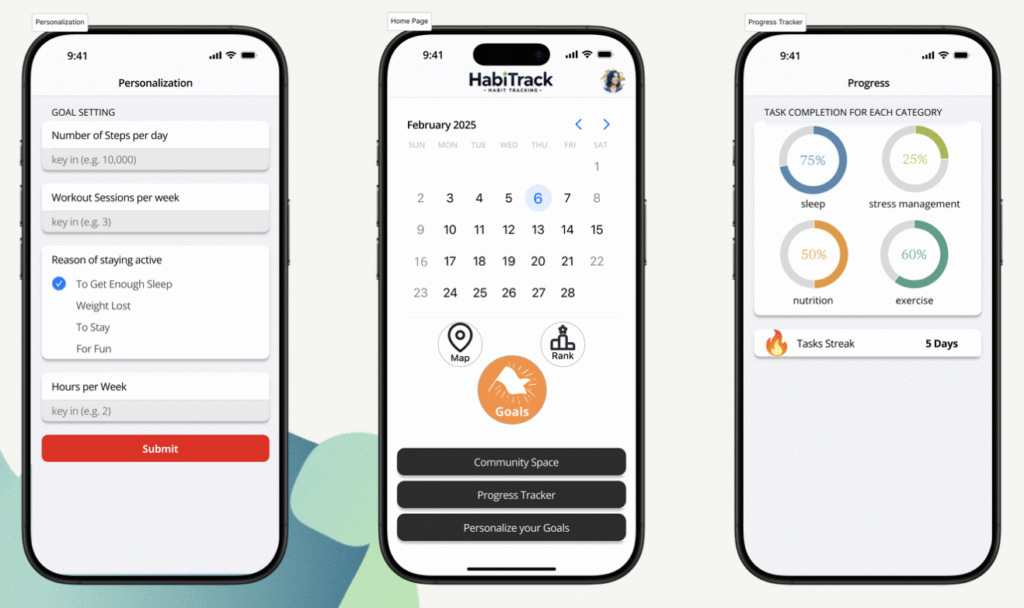Your cart is currently empty!
HabiTrack: Inspiring Youth to Embrace a Healthier Lifestyle
As a Computer Engineering student at Singapore Polytechnic, I’m driven by the potential of technology to solve real-world challenges. One of my most rewarding school projects is HabiTrack, a mobile app designed to improve the physical and mental well-being of youths aged 17–25 in Queenstown, Singapore. Collaborating with my team—Benedict Leong Jin Yew, Milan Morice, Mao Wan Yan, Shwe Zin Phoo, and Emery Nabil Aydan—I helped create a solution that empowers young people to stay active, manage stress, and build disciplined habits, inspired by role models like Cristiano Ronaldo. This project, presented on February 13, 2025, to Ms. Pearlyn Ann Lim, showcases my passion for using technology to make a positive impact.
The Challenge We Tackled
HabiTrack addresses a pressing issue: nearly 1.8 billion adults worldwide are at risk of disease due to insufficient physical activity. In Queenstown, youths face unique barriers to staying active, such as tight schedules, distractions from social media, and limited access to nearby fitness facilities. Our persona, Milo, a 20-year-old Computer Engineering student living in a Queenstown HDB flat, embodies these challenges. Milo wants to stay fit and disciplined but struggles with distractions and a lack of clear progress tracking. Through HabiTrack, we aimed to provide a tool that makes fitness engaging, accessible, and sustainable for Milo and others like him.
Our Solution: HabiTrack
HabiTrack is a mobile app that transforms habit-building into an exciting, gamified experience. Drawing inspiration from competitive platforms like the Diamond Tournament, we designed features to motivate users through goal setting, social engagement, and practical tools. Here’s what makes HabiTrack stand out:
- Goal Tracking and Personalization: Users can set custom goals, such as sleeping 7 hours nightly, drinking 6–8 glasses of water daily, or walking 10 minutes after meals. The app provides progress trackers and adaptive challenges to keep users on track without overwhelming them.
- Gamification and Rankings: A ranking system lets users like Emma (our prototype user) compete with peers in their area, earning points for completing challenges. For example, Molly leads with 1600 points, while Emma follows closely at 1450. This friendly competition makes fitness fun and motivating.
- Map Integration: The app’s map feature locates nearby fitness centers and community playgrounds, addressing Milo’s need for accessible workout spots in Queenstown.
- Reminders and Notifications: To combat distractions like social media, HabiTrack sends timely reminders for habits like journaling for 10 minutes daily or avoiding screens before bed to improve sleep quality.
- Community Space: Users can connect with others, share progress, and join group challenges, fostering an accountability community that encourages Ronaldo-inspired discipline.
My role in the project focused on contributing to the app’s backend development, ensuring seamless data handling for features like goal tracking and rankings. Leveraging my cloud computing skills, I helped design a scalable system to support user data and real-time updates, aligning with the app’s need for reliability and performance.

A glimpse of HabiTrack’s Goals screen, guiding users to build healthy habits like consistent sleep and hydration.
Refining Through Feedback
To ensure HabiTrack meets user needs, we gathered over 32 pieces of feedback, categorized into low, medium, and high priority. High-priority suggestions included adding activity tracking (e.g., calories burned, step count), social features for challenging friends, and tailored fitness plans. Users also loved the gamification and goal-setting features, with comments like, “A ranking system for fitness? I want to see where I stand!” and “This could really help me stay consistent.” Based on this feedback, we refined the app with four key improvements: enhanced UI/UX design, personalized goal-setting, social and gamification features, and a community space.
The feedback process taught me the importance of user-centered design. By prioritizing actionable suggestions, we ensured HabiTrack is both innovative and practical, addressing real pain points like stress management and lack of motivation.
![HabiTrack Rankings Screen]
Caption: The Rankings screen motivates users by showing their position among peers, like Emma at 1450 points.
Alt Text: Screenshot of HabiTrack’s Rankings page displaying a leaderboard with users like Molly (1600 points) and Emma (1450 points).
The Impact of HabiTrack
HabiTrack has the potential to transform how Queenstown youths approach wellness. By promoting small, sustainable habits—like 5-minute morning stretches or post-meal walks—the app helps users build a disciplined lifestyle without feeling overwhelmed. The community features foster connection, making fitness a shared journey rather than a solitary one. For Milo, HabiTrack offers a way to manage stress, stay active, and emulate the discipline of his role model, Cristiano Ronaldo.
As a team, we also engaged stakeholders like fitness influencers, brands, and businesses to amplify the app’s reach. The positive user feedback, with many expressing excitement about the challenges and ease of use, reinforces HabiTrack’s value. Data from our surveys showed a promising likelihood-to-use score, which we visualized in a distribution graph, highlighting the app’s appeal.
What I Learned
Working on HabiTrack deepened my understanding of mobile app development and user engagement. From designing a scalable backend to incorporating gamification, I honed my technical and problem-solving skills. Collaborating with my team taught me how to balance creativity with feasibility, especially when narrowing down 15 raw concepts to our final solution. Most importantly, this project reinforced my belief in technology’s power to drive social good, inspiring me to pursue more impactful projects in my career.
![HabiTrack Map Feature]
Caption: The Map feature helps users find nearby fitness centers and playgrounds in Queenstown.
Alt Text: Screenshot of HabiTrack’s Map screen showing nearby fitness centers and community playgrounds in Queenstown.
HabiTrack is more than just a school project—it’s a step toward empowering youth to live healthier, more disciplined lives. I’m excited to continue exploring ways to blend technology with wellness, and I hope HabiTrack inspires others to take charge of their well-being.